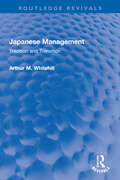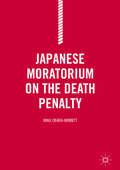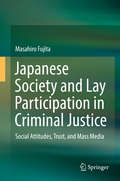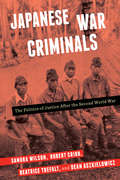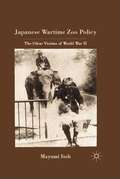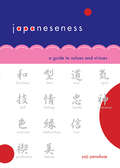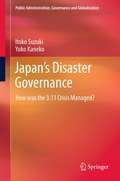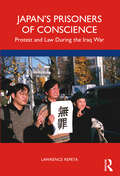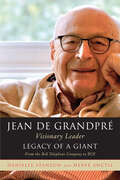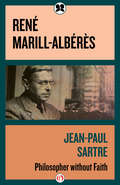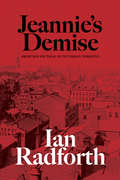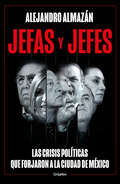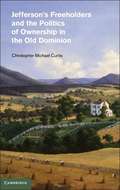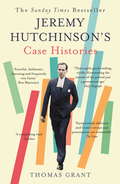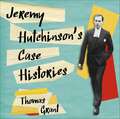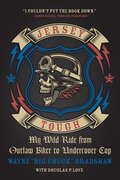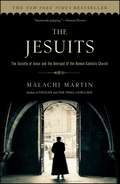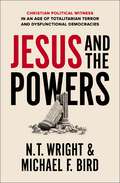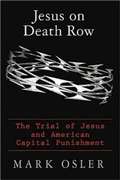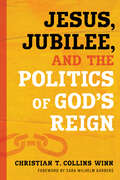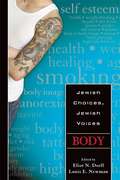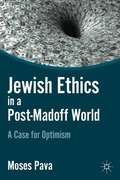- Table View
- List View
Japanese Management: Tradition and Transition (Routledge Revivals)
by Arthur M. WhitehillFirst published in 1991, Japanese Management succeeds in filling a major gap by providing a thorough account of the evolution and day-to-day practices of management within the Japanese firm. The 14 chapters not only build the historical framework and modern cultural, economic, and social setting, but also effectively deal with the process of management. The final two chapters address some future challenges facing Japanese firms as they operate in the global business environment. This comprehensive book is a must read for students of business management.
Japanese Moratorium on the Death Penalty
by Mika Obara-MinnittOffering a timely reanalysis of the issue of Japan's capital punishment policy, this cutting edge volume considers the de facto moratorium periods in Japan's death penalty system and proposes an alternative analytical framework to examine the policy. Addressing how the Ministry of Justice in Japan justified capital punishment policy during the de facto moratorium periods from 1989 to 1993, from 2009 to 2010 and from 2010 to 2012, the author debates the misconceptions surrounding the significance of these moratoriums. The book evidences the approach, rationale and evolution of Japan's Ministry of Justice in consistently justifying capital punishment policy during the different execution-free periods and provides a better understanding of the powerful unelected elite who actually drive the capital punishment system in Japan. Based on parliamentary proceedings, public opinion surveys and periodical reports by both international and domestic human rights NGOs as well as interviews of government ministers, NGO staff, pro- and anti-death-penalty advocates, this text is key reading for those interested in Japan, its government, criminal justice system and policies on the death penalty and human rights.
Japanese Society and Lay Participation in Criminal Justice: Social Attitudes, Trust, and Mass Media
by Masahiro FujitaThis book describes the state of the lay participation system in criminal justice, saiban-in seido, in Japanese society. Starting with descriptions of the outlines of lay participation in the Japanese criminal justice system, the book deals with the questions of what the lay participants think about the system after their participation, how the general public evaluate the system, whether the introduction of lay participation has promoted trust in the justice system in Japan, and the foci of Japanese society’s interest in the lay participation system. To answer these questions, the author utilizes data obtained from social surveys of actual participants and of the general public. The book also explores the results of quantitative text analyses of newspaper articles. With those data, the author describes how Japanese society evaluates the implementation of the system and discusses whether the system promotes democratic values in Japan.
Japanese War Criminals: The Politics of Justice After the Second World War
by Robert Cribb Sandra Wilson Beatrice Trefalt Dean AszkielowiczBeginning in late 1945, the United States, Britain, China, Australia, France, the Netherlands, and later the Philippines, the Soviet Union, and the People's Republic of China convened national courts to prosecute Japanese military personnel for war crimes. The defendants included ethnic Koreans and Taiwanese who had served with the armed forces as Japanese subjects. In Tokyo, the International Military Tribunal for the Far East tried Japanese leaders. While the fairness of these trials has been a focus for decades, Japanese War Criminals instead argues that the most important issues arose outside the courtroom. What was the legal basis for identifying and detaining subjects, determining who should be prosecuted, collecting evidence, and granting clemency after conviction? The answers to these questions helped set the norms for transitional justice in the postwar era and today contribute to strategies for addressing problematic areas of international law. Examining the complex moral, ethical, legal, and political issues surrounding the Allied prosecution project, from the first investigations during the war to the final release of prisoners in 1958, Japanese War Criminals shows how a simple effort to punish the guilty evolved into a multidimensional struggle that muddied the assignment of criminal responsibility for war crimes. Over time, indignation in Japan over Allied military actions, particularly the deployment of the atomic bombs, eclipsed anger over Japanese atrocities, and, among the Western powers, new Cold War imperatives took hold. This book makes a unique contribution to our understanding of the construction of the postwar international order in Asia and to our comprehension of the difficulties of implementing transitional justice.
Japanese Wartime Zoo Policy
by Mayumi ItohThis book examines Japanese wartime zoo policy during World War II, analyzing the reasons why the Home Ministry destroyed more than 300 showpiece animals throughout Japan well before U. S. air strikes were anticipated, with international comparisons of the effects of the war on zoos in Europe, the United States, and the Middle East.
Japaneseness: A Guide to Values and Virtues
by Yoji YamakuseThis book looks at the core life concepts and shared values that historically and culturally define the quality of "being Japanese. " Among these are reverence, love of nature, group loyalty, hierarchical respect, passion for detail, belief in learning, formality, and acceptance of change. How can Western analogues of these Japanese virtues help us improve our own societies and cultivate inner strength, mindfulness, and long-lasting relationships at home and the workplace? This stimulating exploration of an alternative ethics and humanism is a provocative workbook for "decluttering the spirit. " Yoji Yamakuse is a Tokyo-based consultant on personnel management, staff training, and development of joint projects in cross-cultural environments.
Japan’s Disaster Governance
by Yuko Kaneko Itoko SuzukiNatural disasters are often multifaceted and cause severe damage. Disasters initiated locally can become national and even global crises. Today's world urgently needs a new body of knowledge and techniques for the mitigation of and response to disaster. Central to such a body of knowledge are disaster preparedness, emergency and crisis management systems of government, of which capacity building is becoming an increasingly important element in public administration, management and governance. Today, disasters are to be managed by sound local, national, and global governance, through all the phases of preparedness, prevention, mitigation and then to relief, recovery and re-construction. During all these phases, government plays the most important role. This book provides a case of the disaster governance of Japan, by presenting information and analyses on what happened in the Magnitude 9 Great East Japan Earthquake that caused the huge tsunami and the INES Level 7 Fukushima nuclear power plants accidents on March 11, 2011. In examining this Japanese case study, this book illustrates the socio-economic damage of the stricken areas together with the overall picture of the disasters. It examines Japan's capacity for disaster governance and it's crisis management system in response to the most devastating disaster that the country has ever encountered since the end of WWII. It also offers preliminary findings learned from this experience in the Japan's public administration and governance systems, challenged to be more accountable and transparent during the recovery and reconstruction efforts now in progress.
Japan’s Prisoners of Conscience: Protest and Law During the Iraq War
by Lawrence RepetaThis book is a narrative account of the criminal prosecution of three peaceful protesters in Japan during the Iraq War that tells the inside story of their arrests and trial and examines the larger issues raised by the case. Based on interviews with defendants, lawyers, and eyewitnesses and other Japanese language sources, the book carries rich descriptions of the individuals at the heart of the story, including the charismatic leader of the "Tachikawa Tent Village" who has been protesting since U.S. military forces were stationed in her hometown in the early postwar era. Authored by an attorney who has researched and written on Japanese legal issues for more than three decades and was the plaintiff in a suit that made constitutional history by opening Japan’s courts to free reporting, this book offers expert insights into the forces that affect the right to freedom of political speech in Japan. Illustrating the sharp political conflict that has deeply affected Japan’s defense policy for decades, this book will be of great interest to scholars and students of Comparative Law, Peace Studies, Japanese Society, and Modern Asian History.
Japan�s Maritime Security Strategy
by Lindsay BlackIn recent times, international society has countered a myriad of 'outlaw' threats at sea, including piracy, terrorism, the proliferation of Weapons of Mass Destruction (WMD) and the threat posed by 'rogue states'. Whilst the US has promoted 'coalitions of the willing' and sought to transform international maritime law in response to these 'outlaws', Japanese governments have developed an innovative maritime security strategy centering on the Japan Coast Guard (JCG). Concerned by Japan's international image as a former imperialist power, Tokyo has relied upon the identity of the JCG as a law enforcement and rescue organization to garner support for its maritime security strategy. Japan's non-military efforts have developed the capacities of states and built institutions in the Southeast Asian region and beyond. The JCG's response to maritime 'outlaws' belies characterizations of Japan as a passive state that does not contribute to international order.
Jean de Grandpré: Legacy of a Giant
by Danielle Stanton Hervé AnctilVisionary leader and businessman Jean de Grandpré has earned many nicknames: he is known variously as the Simplifier, the Architect, and the Strategist. A lawyer when he joined Bell Canada in 1966, he went on to build a telecommunications empire that spanned the continent, crossing paths with politicians, moguls, and philanthropists along the way.Beginning as Bell’s general counsel, de Grandpré quickly rose through the corporate ranks and became president in 1973. A few years later he created Bell Canada Enterprises, one of America’s largest telecommunications companies. A globally recognized manager and director, he has served on the boards of numerous companies, both in Canada and abroad. As generous as he is discreet, he is involved with several charities, including the Papillon Foundation, which helps disabled children. At McGill University, his alma mater, De Grandpré served as chancellor from 1984 to 1991 and is now governor emeritus and chancellor emeritus.Danielle Stanton and Hervé Anctil retrace the admirable career of this influential man whose life has spanned a century. Offering insight into the secrets of his success, Jean de Grandpré will inspire new generations of entrepreneurs.
Jean-Paul Sartre: Philosopher Without Faith
by René Marill-AlbérèsProfessor Albérès in this well-ordered volume traces through successive works the elaboration of various concepts now linked to French Existentialism—anguish, nausea, hypocrisy, lucidity, consciousness, conformity, commitment, ethical values, situation, etc. Translated from the French by Wade Baskin.
Jeannie’s Demise: Abortion on Trial in Victorian Toronto
by Ian RadforthAugust 1, 1875, Toronto: The naked body of a young woman is discovered in a pine box, half-buried in a ditch along Bloor Street. So begins Jeannie’s Demise, a real-life Victorian melodrama that played out in the bustling streets and courtrooms of “Toronto the Good,” cast with all the lurid stock characters of the genre. Historian Ian Radforth brings to life an era in which abortion was illegal, criminal proceedings were a spectator sport, and coded advertisements for back-alley procedures ran in the margins of newspapers. At the centre of the story is the elusive and doomed Jeannie Gilmour, a minister’s daughter whose independent spirit can only be glimpsed through secondhand accounts and courtroom reports. As rumours swirl about her final weeks and her abortionists stand trial for their lives, a riveted public grapples with questions of guilt and justice, innocence and intent. Radforth’s intensive research grounds the tragedy of Jeannie’s demise in sharp historical analysis, presenting over a dozen case studies of similar trials in Victorian-era Canada. Part gripping procedural, part meticulous autopsy, Jeannie’s Demise opens a rare window into the hidden history of a woman’s right to choose.
Jefas y jefes: Las crisis políticas que forjaron a la Ciudad de México
by Alejandro Almazán¿Cuauhtémoc Cárdenas vetó a Porfirio Muñoz Ledo para ser candidato a la jefatura de Gobierno? ¿AMLO tenía la residencia capitalina? ¿Qué estaba haciendo Marcelo Ebrard cuando lincharon a los policías en Tláhuac? ¿Claudia Sheinbaum es feminista? ¿Miguel Ángel Mancera quiso destruir a Ebrard? ¿Quiénes son los responsables del desplome de la Línea 12? ¿Qué provocó la tragedia del New’s Divine? ¿Por qué se distanciaron Rosario y AMLO? ¿Dónde surgió la mafia del poder? Durante los más de 25 años desde que se instauró la jefatura de Gobierno de lo que todavía se llamaba Distrito Federal han pasado distintas jefas y jefes por ahí. Cuauhtémoc Cárdenas, Rosario Robles, Andres Manuel López Obrador, Alejandro Encinas, Marcelo Ebrard, Miguel Ángel Mancera y Claudia Sheinbaum distan mucho entre sí, tanto en el discurso como en las formas. Pero hay algo en lo que coinciden: las crisis políticas. A través de una amplia investigación hemerográfica, así como una buena cantidad de entrevistas con personajes clave dentro y fuera de los gobiernos capitalinos, Alejandro Almazán -tres veces ganador del Premio Nacional de Periodismo- hace un recuento a lo largo de las administraciones de las principales crisis políticas -las más mediáticas y algunas desconocidas- que han marcado el rumbo de la ciudad desde 1997. Jefas y jefes es un ejercicio monumental de memoria histórica, la crónica política de la Ciudad de México que nos permitirá entender cómo fue que llegaron al poder los que hoy gobiernan y recordar, de paso, los abusos de la clase política. « Jefas y jefes, brillantemente reporteado y escrito, nos da la verdadera historia de cómo ha sido gobernada la Ciudad de México. Al fin entiendo dónde vivo, la gloria y la desgracia.» -Francisco Goldman, finalista del premio Pulitzer de ficción 2022
Jefferson's Freeholders and the Politics of Ownership in the Old Dominion
by Christopher Michael CurtisJefferson's Freeholders and the Politics of Ownership in the Old Dominion explores the historical processes by which Virginia was transformed from a British colony into a Southern slave state. It focuses on changing conceptualizations of ownership and emphasizes the persistent influence of the English common law on Virginia's postcolonial political culture. The book explains how the traditional characteristics of land tenure became subverted by the dynamic contractual relations of a commercial economy and assesses the political consequences of the law reforms that were necessitated by these developments. Nineteenth-century reforms seeking to reconcile the common law with modern commercial practices embraced new democratic expressions about the economic and political power of labor, and thereby encouraged the idea that slavery was an essential element in sustaining republican government in Virginia. By the 1850s, the ownership of human property had replaced the ownership of land as the distinguishing basis for political power, with tragic consequences for the Old Dominion.
Jeremy Hutchinson's Case Histories: From Lady Chatterley's Lover to Howard Marks
by Thomas GrantTHE SUNDAY TIMES BESTSELLERSHORTLISTED FOR THE CWA NON-FICTION DAGGER'Thomas Grant has brought together Hutchinson's greatest legal hits, producing a fascinating episodic cultural history of post-war Britain that chronicles the end of deference and secrecy, and the advent of a more permissive society . . . Grant brings out the essence of each case, and Hutchinson's role, with clarity and wit' Ben Macintyre, The Times'An excellent book . . . Grant recounts these trials in limpid prose which clarifies obscurities. A delicious flavouring of cool irony, which is so much more effective than hot indignation, covers his treatment of the small mindedness and cheapness behind some prosecutions' Richard Davenport-Hines, GuardianBorn in 1915 into the fringes of the Bloomsbury Group, Jeremy Hutchinson went on to become the greatest criminal barrister of the 1960s, '70s and '80s. The cases of that period changed society for ever and Hutchinson's role in them was second to none. In Case Histories, Jeremy Hutchinson's most remarkable trials are examined, each one providing a fascinating look into Britain's post-war social, political and cultural history.Accessibly and entertainingly written, Case Histories provides a definitive account of Jeremy Hutchinson's life and work. From the sex and spying scandals which contributed to Harold Macmillan's resignation in 1963 and the subsequent fall of the Conservative government, to the fight against literary censorship through his defence of Lady Chatterley's Lover and Fanny Hill, Hutchinson was involved in many of the great trials of the period. He defended George Blake, Christine Keeler, Great Train robber Charlie Wilson, Kempton Bunton (the only man successfully to 'steal' a picture from the National Gallery), art 'faker' Tom Keating, and Howard Marks who, in a sensational defence, was acquitted of charges relating to the largest importation of cannabis in British history. He also prevented the suppression of Bernardo Bertolucci's notorious film Last Tango in Paris and did battle with Mary Whitehouse when she prosecuted the director of the play Romans in Britain.Above all else, Jeremy Hutchinson's career, both at the bar and later as a member of the House of Lords, has been one devoted to the preservation of individual liberty and to resisting the incursions of an overbearing state. Case Histories provides entertaining, vivid and revealing insights into what was really going on in those celebrated courtroom dramas that defined an age, as well as painting a picture of a remarkable life.To listen to Jeremy Hutchinson being interviewed by Helena Kennedy on BBC Radio 4's A Law Unto Themselves, please follow the link: http://www.bbc.co.uk/programmes/b04d4cpvYou can also listen to him on BBC Radio 4's Desert Island Discs with Kirsty Young: http://www.bbc.co.uk/programmes/b03ddz8m
Jeremy Hutchinson's Case Histories: From Lady Chatterley's Lover to Howard Marks
by Thomas GrantTHE SUNDAY TIMES BESTSELLERSHORTLISTED FOR THE CWA NON-FICTION DAGGER'Thomas Grant has brought together Hutchinson's greatest legal hits, producing a fascinating episodic cultural history of post-war Britain that chronicles the end of deference and secrecy, and the advent of a more permissive society . . . Grant brings out the essence of each case, and Hutchinson's role, with clarity and wit' Ben Macintyre, The Times'An excellent book . . . Grant recounts these trials in limpid prose which clarifies obscurities. A delicious flavouring of cool irony, which is so much more effective than hot indignation, covers his treatment of the small mindedness and cheapness behind some prosecutions' Richard Davenport-Hines, GuardianBorn in 1915 into the fringes of the Bloomsbury Group, Jeremy Hutchinson went on to become the greatest criminal barrister of the 1960s, '70s and '80s. The cases of that period changed society for ever and Hutchinson's role in them was second to none. In Case Histories, Jeremy Hutchinson's most remarkable trials are examined, each one providing a fascinating look into Britain's post-war social, political and cultural history.Accessibly and entertainingly written, Case Histories provides a definitive account of Jeremy Hutchinson's life and work. From the sex and spying scandals which contributed to Harold Macmillan's resignation in 1963 and the subsequent fall of the Conservative government, to the fight against literary censorship through his defence of Lady Chatterley's Lover and Fanny Hill, Hutchinson was involved in many of the great trials of the period. He defended George Blake, Christine Keeler, Great Train robber Charlie Wilson, Kempton Bunton (the only man successfully to 'steal' a picture from the National Gallery), art 'faker' Tom Keating, and Howard Marks who, in a sensational defence, was acquitted of charges relating to the largest importation of cannabis in British history. He also prevented the suppression of Bernardo Bertolucci's notorious film Last Tango in Paris and did battle with Mary Whitehouse when she prosecuted the director of the play Romans in Britain.Above all else, Jeremy Hutchinson's career, both at the bar and later as a member of the House of Lords, has been one devoted to the preservation of individual liberty and to resisting the incursions of an overbearing state. Case Histories provides entertaining, vivid and revealing insights into what was really going on in those celebrated courtroom dramas that defined an age, as well as painting a picture of a remarkable life.To listen to Jeremy Hutchinson being interviewed by Helena Kennedy on BBC Radio 4's A Law Unto Themselves, please follow the link: http://www.bbc.co.uk/programmes/b04d4cpvYou can also listen to him on BBC Radio 4's Desert Island Discs with Kirsty Young: http://www.bbc.co.uk/programmes/b03ddz8m
Jeremy Hutchinson's Case Histories: From Lady Chatterley's Lover to Howard Marks
by Thomas Grant'Throughout a long career, [Jeremy Hutchinson's] brilliant and stylish advocacy achieved success in cases that looked unwinnable' Helena Kennedy'Jeremy was not just a good lawyer; he was fearless in standing up to judges. He was the most formidable advocate of the 1960s and '70s and he had a marvellous sense of mischief' Geoffrey RobertsonBorn in 1915 into the fringes of the Bloomsbury Group, Jeremy Hutchinson went on to become the greatest criminal barrister of the 1960s, '70s and '80s. The cases of that period changed society for ever and Hutchinson's role in them was second to none. In Case Histories, Thomas Grant examines Jeremy Hutchinson's most remarkable trials, each one providing a fascinating look into Britain's post-war social, political and cultural history.Accessibly and entertainingly written, Case Histories provides a definitive account of Jeremy Hutchinson's life and work. From the sex and spying scandals which contributed to Harold Macmillan's resignation in 1963 and the subsequent fall of the Conservative government, to the fight against literary censorship through his defence of Lady Chatterley's Lover and Fanny Hill, Hutchinson was involved in many of the great trials of the period. He defended George Blake, Christine Keeler, Great Train robber Charlie Wilson, Kempton Bunton (the only man successfully to 'steal' a picture from the National Gallery), art 'faker' Tom Keating, and Howard Marks who, in a sensational defence, was acquitted of charges relating to the largest importation of cannabis in British history. He also prevented the suppression of Bernardo Bertolucci's notorious film Last Tango in Paris and did battle with Mary Whitehouse when she prosecuted the director of the play Romans in Britain.Above all else, Jeremy Hutchinson's career, both at the bar and later as a member of the House of Lords, has been one devoted to the preservation of individual liberty and to resisting the incursions of an overbearing state. Case Histories provides entertaining, vivid and revealing insights into what was really going on in those celebrated courtroom dramas that defined an age, as well as painting a picture of a remarkable life.To listen to Jeremy Hutchinson being interviewed by Helena Kennedy on BBC Radio 4's A Law Unto Themselves, please follow the link: http://www.bbc.co.uk/programmes/b04d4cpvYou can also listen to him on BBC Radio 4's Desert Island Discs with Kirsty Young: http://www.bbc.co.uk/programmes/b03ddz8m(P)2015 John Murray Press
Jersey Tough: My Wild Ride from Outlaw Biker to Undercover Cop
by Wayne "Big Bradshaw Douglas P. LoveThis entertaining true crime memoir chronicles one man&’s redemptive journey from motorcycle gang enforcer to undercover police officer. The only patch-wearing outlaw biker to become a sworn police officer—and live to tell his tale In 1977, Wayne &“Big Chuck&” Bradshaw was Jersey tough. He was a member of the outlaw Pagans bike gang, a One Percenter, and had earned his colours in a world of boozing, bloody bar fights, and high-stakes crime. But after getting too close to extreme violence, Bradshaw made the life-threatening decision to change his path. The toughness Bradshaw used to survive biker life led him to a distinguished and heroic career as an undercover narcotics officer for the same New Jersey police department that had once arrested him. Bradshaw tells his story with the truth of the streets, from his time in the U.S. Army to his decision to join the Pagans, to the wild adventures of working narcotic stings. He rode with truly dangerous criminals and then returned to those same places as a cop. He tracks down fugitives in Jersey&’s toughest neighbourhoods, risks his life rescuing dozens from a fire in a seniors&’ residence, and volunteers in the aftermath of 9/11. Jersey Tough is an unflinching memoir of personal struggle, of battling with darkness, and ultimately of redemption. Praise for Jersey Tough&“Bradshaw delivers both unflinching honesty and gritty, raw action in this fast-moving thriller.&” —Joe Pistone, a.k.a. Donnie Brasco &“Fast-paced, brutally honest, and compelling.&” —Lisa Pulitzer, New York Times–bestselling author&“As a former sergeant-at-arms in one of the other &“Big Four&” motorcycle clubs, I can confirm the authenticity of the biker tales graphically revealed on these pages. Epxosing his courage as well as his frailties, Big Chuck bares all with surprising candor.&” —Glenn Heggstad, author of Two Wheels Through Terror&“[An] immensely entertaining memoir. . . . This fascinating book is true-crime writing at its best and will appeal to anyone interested in the sordid dealings of America's criminal underworlds.&”—Publishers Weekly
Jesuits: The Society of Jesus and the Betrayal of the Roman Catholic Church
by Malachi MartinIn The Jesuits, Malachi Martin reveals for the first time the harrowing behind-the-scenes story of the "new" worldwide Society of Jesus. The leaders and the dupes; the blood and the pathos; the politics, the betrayals and the humiliations; the unheard-of alliances and compromises. The Jesuits tells a true story of today that is already changing the face of all our tomorrows.
Jesus and the Powers: Christian Political Witness in an Age of Totalitarian Terror and Dysfunctional Democracies
by N. T. Wright Michael F. BirdAn urgent call for Christians everywhere to explore the nature of the kingdom amid the political upheaval of our day.Should Christians be politically withdrawn, avoiding participation in politics to maintain their prophetic voice and to keep from being used as political pawns? Or should Christians be actively involved, seeking to utilize political systems to control the levers of power?In Jesus and the Powers, N. T. Wright and Michael F. Bird call Christians everywhere to discern the nature of Christian witness in fractured political environments. In an age of ascending autocracies, in a time of fear and fragmentation, amid carnage and crises, Jesus is king, and Jesus&’s kingdom remains the object of the church's witness and work.Part political theology, part biblical overview, and part church history, this book argues that building for Jesus's kingdom requires confronting empire in all its forms. This approach should orient Christians toward a form of political engagement that contributes to free democratic societies and vigorously opposes political schemes based on autocracy and nationalism. Throughout, Wright and Bird reflect on the relevance of this kingdom-oriented approach to current events, including the Russian-Ukraine conflict, the China-Taiwan tension, political turmoil in the USA, UK, and Australia, and the problem of Christian nationalism.
Jesus on Death Row: The Trial of Jesus and American Capital Punishment
by Mark OslerWhat does the most infamous criminal proceeding in history--the trial of Jesus of Nazareth--have to tell us about capital punishment in the United States?Jesus Christ was a prisoner on death row. If that statement surprises you, consider this fact: of all the roles that Jesus played--preacher, teacher, healer, mentor, friend--none features as prominently in the gospels as this one, a criminal indicted and convicted of a capital offense. Now consider another fact: the arrest, trial, and execution of Jesus bear remarkable similarities to the American criminal justice system, especially in capital cases. From the use of paid informants to the conflicting testimony of witnesses to the denial of clemency, the elements in the story of Jesus' trial mirror the most common components in capital cases today.Finally, consider a question: How might we see capital punishment in this country differently if we realized that the system used to condemn the Son of God to death so closely resembles the system we use in capital cases today? Should the experience of Jesus' trial, conviction, and execution give us pause as we take similar steps to place individuals on death row today? These are the questions posed by this surprising, challenging, and enlightening book
Jesus, Jubilee, and the Politics of God’s Reign (Prophetic Christianity Series (PC))
by Christian T. Collins WinnWhat if the kingdom of God is not a place, but a person? In this timely monograph, Christian T. Collins Winn argues that the kingdom of God is Jesus himself. Drawing on a wide breadth of liberation theology, Jesus, Jubilee, and the Politics of God&’s Reign amplifies the echoes of salvation history in contemporary struggles for social justice. Collins Winn demonstrates how the institution of the Jubilee year exemplifies the kingdom of God. A semicentennial celebration prescribed in the book of Leviticus, Jubilee prescribed the redistribution of wealth and freeing of prisoners. Hope for Jubilee persists in apocalyptic rhetoric, from the exhortations of Old Testament prophets to those of modern progressives. Likewise, Jesus&’s ministry, passion, and resurrection convey the justice of Jubilee and urgency of apocalypse. His conquest over death represents the ultimate vindication of the oppressed in the kingdom of God, an &“outpouring of Spirit&” seen today in continuing restorative efforts by oppressed communities in the face of death-dealing institutions. Historically informed and passionately written, Jesus, Jubilee, and the Politics of God&’s Reign challenges readers to find Jesus in the marginalized persons of our own time.
Jewish Bioethics
by Yechiel Michael BarilanThis book presents the discourse in Jewish law and rabbinic literature on bioethical issues, highlighting practical problems in their socio-historical contexts. Yechiel Michael Barilan discusses end-of-life care, abortion, infertility treatments, the brain death debate, and the organ market. Barilan also presents the theology and spirituality of Jewish medical law, the communal responsibility for healthcare, and the charitable sick-care societies that flourished in the Jewish communities until the beginning of the twentieth century.
Jewish Choices, Jewish Voices: Body (Volume #1)
by Elliot N. Dorff Louis E. NewmanThis new JPS ethics series deals with some of the most critical moral issues of our time. Each volume in this series presents traditional and contemporary sources on specific topics, followed by hypothetical cases and study questions to provoke discussion. Supplementing these are brief essays written by a diverse group- political figures and journalists, business professionals and authors, scholars and artists, young voices and old, traditional believers and iconoclasts. These voices from the Jewish tradition and today's Jewish community give us new questions and perspectives to think about and encourage us to consider our moral choices in a new light. Jewish Choices Jewish Voices: Body What are our obligations and rights to our own bodies? What does Judaism say about tattoos? Piercings? About our obligations to exercise and eat properly? What about smoking? Alcohol? Recreational drugs? Who owns our organs? If resources are limited, whose body comes first and how do we decide? Why do so many young Jews suffer from eating disorders?
Jewish Ethics in a Post-Madoff World
by Moses PavaMoses Pava explores new and alternative ways of relating to Jewish texts and concepts. In doing so, he invents a nuanced, flexible, and sufficiently sensitive vocabulary to conduct productive ethical dialogues, both within and between communities.
